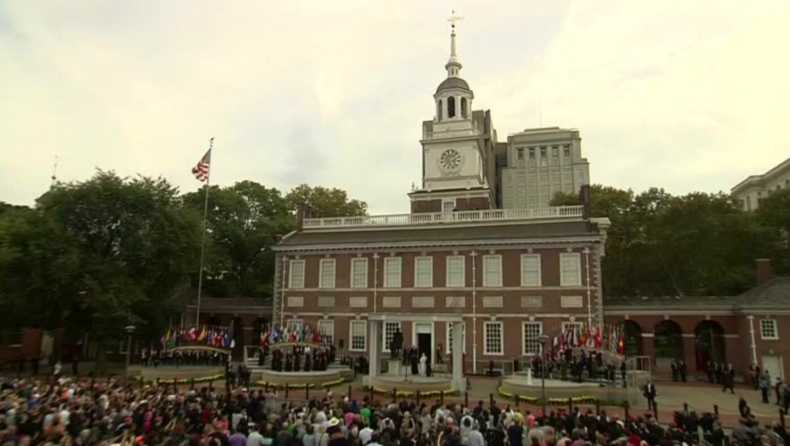On Saturday, NV Ramana, who is the Chief Justice of India, told everyone to keep working hard to protect and advance democracy and freedom.
The Declaration of Independence was ratified at Independence Hall in 1776 by the Second Continental Congress. The structure was designed to be the Pennsylvania State House, despite being known as Independence Hall today. All three components of Pennsylvania’s colonial government were headquartered initially there.

The Chief Justice of India:
“This monument commemorates a turning point in human history. The principles that emerged from this revered location have inspired all democracies. It stands for unbreakable assurances and commitments that define human dignity and existence. Standing in this revered space, one cannot but be inspired by the courage, energy, and ideas that the founding fathers of the United States of America had and that still ring true today all around the world. The liberty, freedom, and democracy that our predecessors fought for must be maintained and advanced by all of us as global citizens. The only homage worthy of their sacrifices is that. “
After visiting Independence Hall in Philadelphia, USA, the Chief Justice of India NV Ramana said that it was important for people to work hard for the freedom, independence, and democracy that their ancestors fought for.
Additionally, CJI paid a prominent alumni of Columbia University in New York, Dr. B R Ambedkar, a heartfelt homage during his visit.
At that time, Justice Ramana noted:
I had the honor of following in his footsteps today. For me, it’s a really emotional time. I don’t come from a wealthy family. My father is a typical farmer. I am the first person in my family to graduate from college.
I am here today as the Chief Justice of India. This potential occurred as a result of Dr. B. R. Ambedkar’s efforts in the creation of India’s most progressive and forward-thinking Constitution. I shall always be grateful to this visionary, along with millions of others.
Credit will be given to the Indian Constitution and the people’s confidence in it when the transforming journey of the fledgling republic of India is written down in history books.
A great leader like Dr. Ambedkar was educated at this university, and it is a privilege for me to be standing here today.
He served as one of the country’s founding fathers. Generations of Indians have been motivated by his example to value and embrace their unique identities. My country’s progress over the last 75 years is evidence of the effectiveness of democracy.
People must understand how important democracy is, especially to students and young people. The only way to maintain and improve democracy is through your active involvement. Peace in the world can only be built on a government system that is truly democratic.
The History of Independence Hall

America was founded at Independence Hall. In this edifice, discussions and signatures on the U.S. Constitution and Declaration of Independence took place. Independence Hall is a UNESCO World Heritage Site because of the history of the country’s founding documents, which represent freedom and democracy around the world.
The building’s construction began in 1732. Originally housing all three elements of Pennsylvania’s colonial government, the structure was intended to serve as the Pennsylvania State House. The Second Continental Congress and, subsequently, the Constitutional Convention held their sessions at the Assembly Room, which was lent by the Pennsylvania Assembly. Here, the Articles of Confederation were ratified in 1781, George Washington was named Commander in Chief of the Continental Army in 1775, and Benjamin Franklin sat in the “Rising Sun” chair in 1787.













